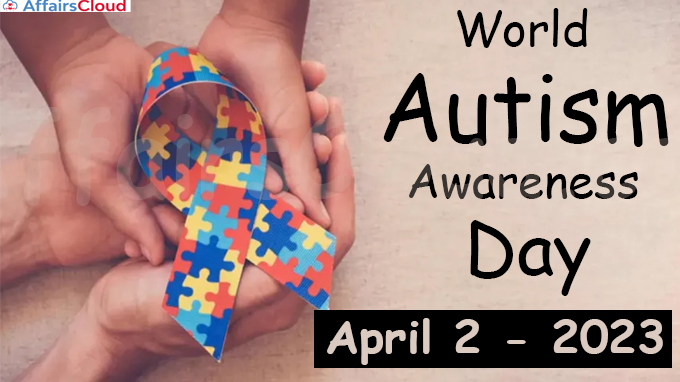 United Nations (UN)’s World Autism Awareness Day (WAAD) is annually observed across the globe on April 2 to raise awareness about Autism Spectrum Disorder (ASD) and promote the livelihood of people having autism.
United Nations (UN)’s World Autism Awareness Day (WAAD) is annually observed across the globe on April 2 to raise awareness about Autism Spectrum Disorder (ASD) and promote the livelihood of people having autism.
- World Autism Awareness Day 2023 was observed on 2nd April 2023 under the theme “Transforming the narrative: Contributions at home, at work, in the arts and in policymaking”.
WAAD 2023 observance is organised by the United Nations Department of Global Communication(DGC) and the Department of Economic and Social Affairs(DESA) in collaboration with the Switzerland-based Institute of Neurodiversity (ION), an organisation established and run by neurodivergent people and allies.
The Autism Awareness Ribbon:
The Puzzle Ribbon was adopted as the universal sign of autism in 1999.
i. The Puzzle pattern of the ribbon reflects the mystery and complexity of autism. A “puzzle” ribbon is to promote Autism and Aspergers Awareness.
ii. The different colours and shapes represent the diversity of those living with this disorder.
iii. The brightness of the ribbon signals hopes through research and increasing awareness among people.
Background:
i. The United Nations General Assembly (UNGA) adopted the resolution A/RES/62/139 on 18th December 2007 and proclaimed April 2 of every year World Autism Awareness Day.
ii. The 1st ever World Autism Awareness Day was observed on 2nd April 2008.
WAAD 2023:
Event:
i. On 2nd April 2023, WAAD 2023 observed a virtual event on “Transformation: Toward a Neuro-Inclusive World for All”.
ii. The event was organised in close collaboration with autistic people and featured autistic people from around the world.
iii. The event is co-sponsored by the Permanent Mission of Poland to the United Nations, with support provided by Group for Autism, Insurance, Investment and Neurodiversity (GAIN).
iv. Through this event, ION is working to help create a world where neurodivergent individuals feel accepted, represented, included, empowered and heard.
Efforts of the UN:
i. The UN Disability Inclusion Strategy lays the foundation for Sustainable and transformative progress on disability inclusion through all 3 pillars of the UN’s work: Peace and Security; Human rights; and Development.
- It enables support for the implementation of the Convention on the Rights of Persons with Disabilities and other international human rights instruments.
- It also supports the achievement of the Sustainable Development Goals, the Agenda for Humanity, and the Sendai Framework for Disaster Risk Reduction.
ii. The Division for Social Inclusive Social Development (DISD) of the UN Department of Economic and Social Affairs (UNDESA) administers the UN Programme on Disability/Secretariat for the Convention on the Rights of People with Disabilities (SCRPD).
- It promotes the rights and advancement of persons with disabilities within a broad mandate provided by some actions and rules implemented by the DISD, and other relevant human rights and development instruments.
Transforming the narrative: Contributions at home, at work, in the arts and in policymaking
i. The UN shifts its focus from trying to cure or convert autistic individuals to accepting, supporting, and including autistic people and advocating for their rights.
- It is a major transformation for all autistic people, their allies, the wider neurodiversity community and the world at large.
ii. The transformation enables autistic people to claim their dignity and self-esteem and to become fully integrated as valued members of their families and societies.
About the United Nations (UN):
Secretary-General- António Guterres
Headquarters- New York, USA
Establishment- 1945




